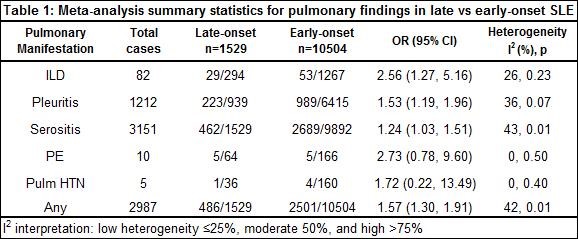Session Information
Session Type: ACR Poster Session B
Session Time: 9:00AM-11:00AM
Background/Purpose: Phenotypes often differ in late-onset systemic lupus erythematosus (SLE) compared to SLE features in early-onset patients. Prior studies have suggested that there may be more pulmonary disease in the older onset population. This systematic review and meta-analysis evaluates the differences in pulmonary manifestations between late and early-onset SLE.
Methods: We searched the literature using PubMed, CINAHL, Web of Science and Cochrane Library. We excluded studies that did not include ACR SLE classification criteria, lacked early-onset controls, defined late-onset SLE as <50 years of age, or were not written in English. Two authors rated study quality using the Newcastle Ottawa Quality Scale. We used random effects models to create Forest plots to compare odds ratios and 95% confidence intervals of pulmonary manifestations by onset age. We specifically assessed interstitial lung disease, serositis, pleuritis, pulmonary embolism, pulmonary hypertension, or a composite of any lung disease. We assessed heterogeneity using I2.
Results: Thirty six studies, representing 10,504 early-onset and 1,529 late-onset patients with SLE, met eligibility criteria. The prevalence of pulmonary manifestations was higher in the late-onset group as shown in Table 1. Interstitial lung disease (ILD) was nearly three times as common (OR 2.56 (1.27, 5.16)) with low study heterogeneity (I2 23%, p=0.23). Pleuritis (OR 1.53 (1.19, 1.96)) and serositis (OR 1.24 (1.03, 1.51)) were also more common in the late-onset group for which there was low to moderate heterogeneity (I2 36%, p=0.07 and I2 43%, p=0.005). The mean Newcastle Ottawa Quality Scale score for study quality was 6.9 ±0.7 (scale 0-9).
Conclusion: Pulmonary manifestations of SLE appear to be more common in late-onset SLE patients compared to their younger peers, particularly ILD. Age-related changes of the immune system, tobacco and antigen exposure history, race, and possible association with Sjogren’s syndrome are possible contributors that should be examined in future studies. 
To cite this abstract in AMA style:
Medlin J, Hansen K, McCoy S, Bartels CM. Pulmonary Disease in Late Versus Early Systemic Lupus Erythematosus: A Systematic Review and Meta-Analysis [abstract]. Arthritis Rheumatol. 2016; 68 (suppl 10). https://acrabstracts.org/abstract/pulmonary-disease-in-late-versus-early-systemic-lupus-erythematosus-a-systematic-review-and-meta-analysis/. Accessed .« Back to 2016 ACR/ARHP Annual Meeting
ACR Meeting Abstracts - https://acrabstracts.org/abstract/pulmonary-disease-in-late-versus-early-systemic-lupus-erythematosus-a-systematic-review-and-meta-analysis/
